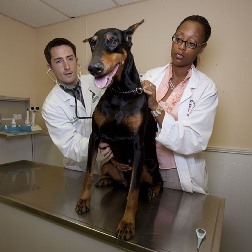How to Enroll In a Vet Assistant Program near Potlatch Idaho
 Achieving your lifelong goal of working with and caring for pets by enrolling in a veterinarian college near Potlatch ID could at first seem like a daunting undertaking. After all, you must find and enroll in a college that will furnish the necessary training so that you can be successful as a vet technician, assistant or technologist. But just how do you approach evaluating and comparing schools so that you can make the best selection? Many potential students launch their due diligence process by searching for schools that are near their homes. After they have located some local colleges, they ascertain which ones have the cheapest tuition and hone in on those. Although location and cost are significant factors when comparing vet tech schools, they are by no means the only significant ones when making your comparisons. Qualifiers such as internship programs and accreditation should be looked into also. The main idea is that there are questions you should be asking the veterinary tech programs you are looking at before you make a final choice. We have furnished several in this article to help get you started, but before we review them we’ll explore the different roles of vet assistants and techs and the training options offered.
Achieving your lifelong goal of working with and caring for pets by enrolling in a veterinarian college near Potlatch ID could at first seem like a daunting undertaking. After all, you must find and enroll in a college that will furnish the necessary training so that you can be successful as a vet technician, assistant or technologist. But just how do you approach evaluating and comparing schools so that you can make the best selection? Many potential students launch their due diligence process by searching for schools that are near their homes. After they have located some local colleges, they ascertain which ones have the cheapest tuition and hone in on those. Although location and cost are significant factors when comparing vet tech schools, they are by no means the only significant ones when making your comparisons. Qualifiers such as internship programs and accreditation should be looked into also. The main idea is that there are questions you should be asking the veterinary tech programs you are looking at before you make a final choice. We have furnished several in this article to help get you started, but before we review them we’ll explore the different roles of vet assistants and techs and the training options offered.
The Role of a Vet Tech and Assistant
 Among the initial decisions that you will have to make is whether you wish to train as a veterinary assistant, technologist or technician. Part of your determination may be based on the amount of time and money that you have to devote to your training, but the main determiner will probably be which specialization interests you the most. What vet techs and assistants share in common is that they each work under the direct supervision of a practicing and licensed veterinarian. And while there are numerous tasks that they can carry out within the Potlatch ID veterinary clinic or hospital, they can’t prescribe drugs, diagnose conditions, or perform surgical procedures. In those areas they can only provide support to a licensed vet. There are technicians and technologists that work outside of the conventional vet practice, such as for zoos, animal shelters or police departments. Let’s take a look at the job functions and education prerequisites for each specialization.
Among the initial decisions that you will have to make is whether you wish to train as a veterinary assistant, technologist or technician. Part of your determination may be based on the amount of time and money that you have to devote to your training, but the main determiner will probably be which specialization interests you the most. What vet techs and assistants share in common is that they each work under the direct supervision of a practicing and licensed veterinarian. And while there are numerous tasks that they can carry out within the Potlatch ID veterinary clinic or hospital, they can’t prescribe drugs, diagnose conditions, or perform surgical procedures. In those areas they can only provide support to a licensed vet. There are technicians and technologists that work outside of the conventional vet practice, such as for zoos, animal shelters or police departments. Let’s take a look at the job functions and education prerequisites for each specialization.
- Vet Assistants in most instances will have completed a formal training program, either as an intern or apprentice in a practice, or by completing a certificate program at a vocational school or community college near Potlatch ID. As the name implies, their job function is to assist the vets and vet technicians in the completion of their duties. Normally they are not associated with more complicated activities, for example assisting with surgeries. A few of their usual functions may include working at the front desk, preparing and cleaning exam rooms and equipment, or handling pets during examinations.
- Vet Technicians get more extensive training compared to assistants and normally earn a two year Associate Degree, ideally from an American Veterinary Medical Association (AVMA) accredited program. They are in a fashion the veterinarian counterparts of medical nurses, since their fundamental job function is to assist vets with diagnosing and treating animal patients. Where they stand apart from vet assistants is that they are involved in more complex activities, such as assisting with surgeries or providing medicine. All states currently require vet techs pass a credentialing examination for either licensing, registration or certification.
- Vet Technologists are similar to veterinary techs and essentially carry out the same work functions. They are required to earn a Bachelor’s Degree in veterinary technology, which typically takes 4 years. Therefore the main distinction between a vet technician and a technologist is the technologist’s higher level of education. But with an advanced degree comes more work options, higher salaries and potential management positions. They are additionally required to pass a credentialing exam for either registration, certification or licensing.
Veterinary techs and technologists can specialize in areas such as anesthesia, internal medicine or emergency care. Many may earn certification from the American Association for Laboratory Animal Science (AALAS) to work in labs or Potlatch ID area research facilities also.
Vet Online Courses
 An option that might make sense for those with a hectic schedule or who are working full-time while going to veterinarian school is to enroll in an online training program. Since the classes are provided through the internet, students can attend on their own timetable wherever a computer is available. The course of study is taught using several venues, including slide shows, videos and live streaming webinars. And since the majority of veterinary technician and technologist degrees require clinical training, that segment can typically be completed as an internship or work study program at a local Potlatch ID veterinary practice or hospital. Distance learning, as it is also called, may in some instances decrease the cost of your education. Tuition and ancillary expenses, for instance for traveling and study supplies, can be cheaper compared to more conventional classroom programs. Just confirm that the online school that you enroll in is accredited, either by the AVMA or another nationally certified accrediting organization. With the online courses and the practical training, everything is included for a complete education. So if you are dedicated enough to learn in this more self-reliant manner, an online veterinary tech or assistant school may be the right choice for you.
An option that might make sense for those with a hectic schedule or who are working full-time while going to veterinarian school is to enroll in an online training program. Since the classes are provided through the internet, students can attend on their own timetable wherever a computer is available. The course of study is taught using several venues, including slide shows, videos and live streaming webinars. And since the majority of veterinary technician and technologist degrees require clinical training, that segment can typically be completed as an internship or work study program at a local Potlatch ID veterinary practice or hospital. Distance learning, as it is also called, may in some instances decrease the cost of your education. Tuition and ancillary expenses, for instance for traveling and study supplies, can be cheaper compared to more conventional classroom programs. Just confirm that the online school that you enroll in is accredited, either by the AVMA or another nationally certified accrediting organization. With the online courses and the practical training, everything is included for a complete education. So if you are dedicated enough to learn in this more self-reliant manner, an online veterinary tech or assistant school may be the right choice for you.
Things to Ask Vet Assistant and Tech Colleges
 At this point you probably have selected which veterinarian certificate or degree that you want to attain, and if you prefer to study online or attend a school on campus. Since there are a large number of veterinarian community colleges, trade and vocational schools in Idaho as well as across the USA, you must ask some important questions to help fine tune your list of alternatives. As we discussed in our introduction, many future students start by concentrating on location and tuition expense. But we have previously touched on other significant qualifiers, for example accreditation and internship programs. And naturally you want to choose a college that offers the degree and specialty that you would like to earn. These and other factors are reviewed in the checklist of questions that you should ask the Potlatch ID veterinary technician and assistant colleges that you are considering.
At this point you probably have selected which veterinarian certificate or degree that you want to attain, and if you prefer to study online or attend a school on campus. Since there are a large number of veterinarian community colleges, trade and vocational schools in Idaho as well as across the USA, you must ask some important questions to help fine tune your list of alternatives. As we discussed in our introduction, many future students start by concentrating on location and tuition expense. But we have previously touched on other significant qualifiers, for example accreditation and internship programs. And naturally you want to choose a college that offers the degree and specialty that you would like to earn. These and other factors are reviewed in the checklist of questions that you should ask the Potlatch ID veterinary technician and assistant colleges that you are considering.
Is the Veterinary Program Accredited? It’s essential that you make sure that the veterinary assistant or tech college you choose is accredited by a regional or national accrediting organization. As previously discussed, one of the most highly regarded is the American Veterinary Medical Association (AVMA). Trade schools and colleges that are accredited by the AVMA have undergone a demanding review process that verifies you will get a quality education. Also, accreditation is essential if you are applying for a student loan or financial aid, since a large number of programs are not available for non-accredited schools. Last, having a degree or certificate from an accredited school is in many cases a precondition for employment for a number of Potlatch ID veterinarian clinics and hospitals.
What is the School’s Reputation? The veterinary college or vocational school and program you choose must have an excellent reputation within the veterinary community. You can start your due diligence by asking the schools you are looking at for testimonials from the employers in their job assistance network. Other pointers include looking on internet school rating websites and contacting the school’s accrediting organizations as well. You can ask the Idaho school licensing authority if there have been any grievances or violations involving your specific schools. As a final tip, phone some Potlatch ID veterinary clinics that you might want to work for after you get your training. Ask what they think of your school choices. They might even recommend one or more schools not on your list.
Are there Internship Programs? The most effective approach to get clinical hands on training as a vet assistant or tech is to work in a clinical setting. Ask if the programs you are reviewing have internship programs set up with regional veterinarians, vet clinics or hospitals. The majority of veterinary medicine programs require practical training and a large number provide it by means of internships. Not only will the experience be invaluable regarding the practical training, but an internship may also help develop connections in the local Potlatch ID veterinary community and assist in the search for a position after graduation.
Is Job Placement Provided? Finding a job after graduating from a veterinary assistant or tech college may be difficult without the help of a job placement program. To start with, find out what the graduation rates are for the schools you are reviewing. A low rate could signify that the teachers were unqualified to teach the syllabus or that a number of students were dissatisfied with the program and dropped out. Next, verify that the colleges have a job assistance program and ask what their placement rates are. A higher placement rate could mean that the Potlatch ID college has an exceptional reputation within the veterinary community and has a substantial network of contacts for student placements. A low rate may mean that the training is not well regarded by employers or that the job assistance program is a failure at placing students.
How Large are the Classes? If the classes are larger, you most likely will receive little or no one-on-one instruction from the teachers. Request from the Potlatch ID schools you are researching what their classroom student to teacher ratios are. You might also want to participate in some classes (if practical) to observe the interaction between instructors and students. Ask for feedback from students concerning the quality of instruction. Also, talk with the teachers and determine what their backgrounds are as well as their methods of teaching.
Where is the School Located? Of course, we previously talked about location, but there are a few more points to consider on the subject. If you are going to drive to your veterinary assistant classes from work or home, you have to make sure that the commuting time fits into your schedule. For example, driving during the weekend to check out the route won’t be the same as the commute during rush hour traffic, especially if the Potlatch ID school is located close by or within a larger city. In addition, if you do choose to attend a college in another state or even outside of your County of residence, there may be higher tuition charges especially for state and community colleges. On the other hand, attending classes online may be an alternative that will provide you with more flexibility and reduce the need for travel.
Is the Class Schedule Flexible? And finally, it’s essential that you determine if the Idaho vet programs you are looking at offer class times that are sufficiently flexible to accommodate your schedule. For instance, a number of students continue to work full time and can only attend classes on the weekends or in the evenings. Some might only be able to attend class in the morning or in the afternoon. Make certain that the class times you need are offered near Potlatch ID prior to enrolling. In addition, find out if you can make up classes that you may miss because of work, illness or family issues. You may discover that an online program is the ideal solution to fit your vet education into your hectic life.
Why Did You Decide to Become a Vet Assistant?
When getting ready to interview for a veterinary position, it's important to review questions you could be asked. One of the questions that hiring managers typically ask veterinary prospects is "What drove you to choose veterinary care as a profession?". What the interviewer is hoping to uncover is not just the personal reasons you may have for being a vet assistant, but additionally what attributes and skills you possess that make you exceptional at what you do. You will probably be asked questions pertaining primarily to veterinary care, in addition to a significant number of general interview questions, so you need to organize several ideas about how you want to respond to them. Because there are several factors that go into choosing a career, you can respond to this primary question in a variety of ways. When formulating an answer, try to include the reasons the profession appeals to you along with the talents you have that make you an outstanding vet tech and the ideal candidate for the job. Don't make an effort to memorize a response, but write down a few concepts and anecdotes that pertain to your own strengths and experiences. Reviewing sample answers can assist you to prepare your own thoughts, and provide ideas of what to discuss to enthuse the recruiter.Select the Right Vet Technician Program near Potlatch ID
Picking the right vet assistant or tech program is an important first step to beginning a fulfilling career providing treatment and care for animals. Future students looking into veterinary tech or assistant programs need to make their decision based on multiple key factors. Vet assistants, techs and technologists are employed in vet clinics, animal hospitals and animal shelters. They usually handle administrative duties and assist the veterinarian with the animal patients as needed. As we have discussed, it’s essential that you decide on a veterinary medicine program that is both accredited and has an excellent reputation within the field. This goes for online vet tech colleges as well. By asking the questions provided in our checklist for assessing schools, you will be able to narrow down your options so that you can make your final selection. And by picking the best college, you can achieve your goal of becoming a vet technician, assistant or technologist in Potlatch ID.
A Little Bit About Potlatch ID
Potlatch, Idaho
Potlatch is a city in the northwest United States, located in north central Idaho in Latah County, about six miles (10 km) east of the border with Washington. On the Palouse north of Moscow, it is served by State Highway 6, and bordered on the northeast by the small community of Onaway. The population of Potlatch was 804 at the 2010 census.
Potlatch was founded 113 years ago in 1905 as a company town by the Potlatch Corporation.[4] The townsite was chosen because of proximity to the company's large holdings of Western White Pine on the Palouse River. Potlatch was chosen as the mill site; at the time, it was one of the largest sawmills in the U.S. and was the largest white pine sawmill in the world.[citation needed]
Most of Potlatch was built in 1906 and 1907. A total of 143 houses were built in 1906, with 58 more built the following year; other building constructed during that period include boarding houses, an ice house, a Catholic church, hotel, school, and general store.[5]
More Cities of Interest in Idaho
